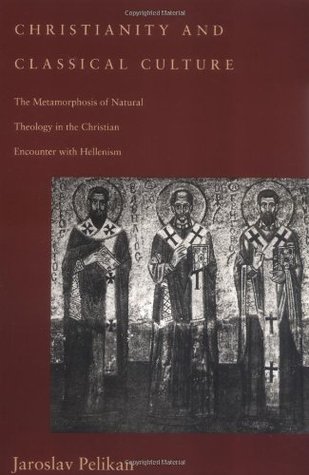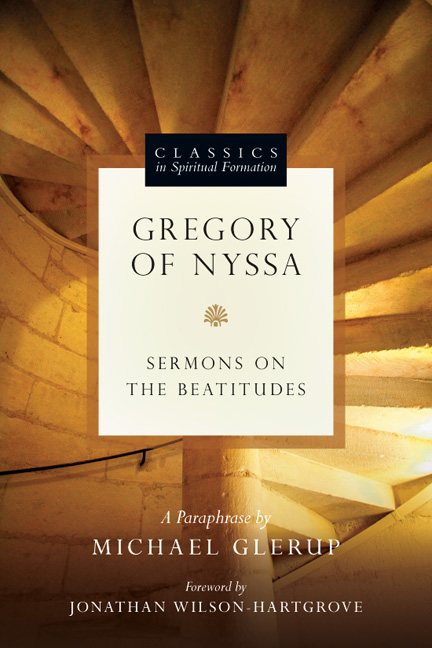
Christianity and Classical Culture: The Metamorphosis of Natural Theology in the Christian Encounter with Hellenism
By Jaroslav Pelikan
My rating: 4 of 5 stars
One of the problems of the Protestant Christianity I am associated with is that, by and large, we are unaware of anything that happened prior to the Reformation. Its Evangelical subculture is even worse, often being unaware of anything that has happened more than ten years ago, or anything outside one’s own church. Thankfully, there has been a resurgence of patristic (church fathers) scholarship in recent years to help redress this imbalance.
This book by church historian Jaroslav Pelikan is an early harbinger of this scholarly resurgence, being published in 1993 as the text of his 1992-1993 Gifford Lectures on Natural Theology at the University of Aberdeen. The book focuses on the work of the Three Cappadocian fathers, Basil the Great, Gregory of Nyssa and Gregory Nazianzus, along with Macrina, the sister of Basil and Gregory of Nyssa.
Pelikan organizes the book into two parts. Part One looks at the natural theology of the Cappadocians in their apologetic engagement with the Hellenistic world as well as Christian heretics. Part Two considers “Natural Theology as Presupposition” looking at how these figures worked from their engagement with Hellenistic thought to the formulation of Christian doctrine through the intersection of natural theology and revelation. The chapters in each part parallel the other part focusing on classical culture, natural theology, the language we use to speak of God, our ways of knowing including the relation of reason to faith, the one and the many, the nature of the cosmos, how God works in time and space, humankind in God’s image, the good, the true and beautiful in our worship, and the “end” of all things.
The cover “blurb” for this book describes Pelikan’s treatment as “erudite”. This is indeed the case and the book demands one’s careful attention. Familiarity with Hellenistic thought including the works of Plato, Socrates, and Aristotle will enhance one’s grasp. And, for those unfamiliar with the key Greek terms which he transliterates, using the glossary of these terms he provides in the end matter is very helpful in reading.
That careful reading will reward the reader in several ways:
- You will realize the tremendous intellectual life of these four figures (including Macrina) and how this was coupled with pastoral and apologetic testimony to the faith in a way that both engaged Hellenistic thought and marked out the Christian faith as distinctive when this thought threatened to distort or assimilate it.
- You gain an appreciation for the critical contribution these thinkers made to our present framework of Christian theology for good or ill. For example, Basil’s work on the Holy Spirit was critical in the church’s affirmation of this sometimes “shadowy” reality as the third member of the Trinity, fully God with the Father and the Son.
- This work also introduces us to a critical approach of these thinkers, the apophatic approach to theology that defines and clarifies theology by negation, by what God is not.
- Finally, we see how Hellenistic thought and categories did have a shaping influence in the theological formulations of the early Christian centuries, for good or ill.

So, if you are interested in learning about the Cappadocian fathers and up for an intellectual challenge, this is a worthy book to consider. Perhaps the most accessible of their works and important as well is Basil’s On the Holy Spirit which is available in English translation from St. Vladimir’s Seminary Press. There is also a modern paraphrase of Gregory of Nyssa’s Sermons on the Beatitudes published by InterVarsity Press (2012), which I reviewed in 2012.
Thank-you to Bob for sharing Review: Christianity and Classical Culture: The Metamorphosis of Natural Theology in the Christian Encounter with Hellenism from his blog Bob on Books (6/30/2014). ~ Thomas B. Grosh IV, Associate Director, Emerging Scholars Network
Bob Trube is a former Associate Director of Faculty Ministry and Director of the Emerging Scholars Network. He blogs on books regularly at bobonbooks.com. He resides in Columbus, Ohio, with Marilyn and enjoys reading, gardening, choral singing, and plein air painting.

Leave a Reply